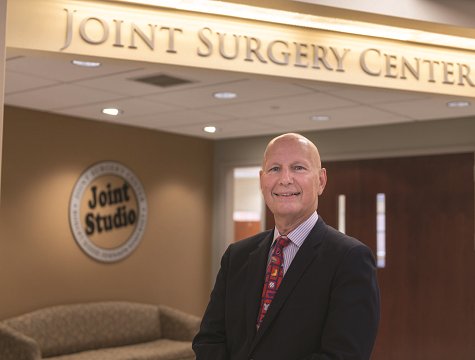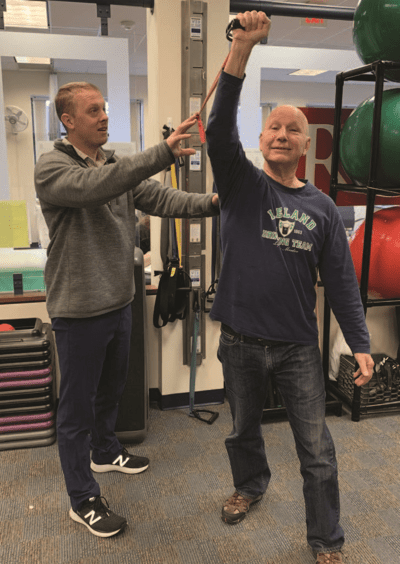“I wasn’t expecting to be able to serve for a year after my surgery, but I beat that schedule by at least four months”

How one physician's quality of life — and tennis game — improved after his shoulder was repaired
In July 2019, Thomas Nordstrom, MD, an orthopedic surgeon at Robert Wood Johnson University Hospital (RWJUH) Somerset, was playing in a tennis tournament in Florida when his backhand suddenly went weak and he was unable to serve.
“I couldn’t lift my right arm,” recalls Dr. Nordstrom, who was the Chief of Orthopedics from 2003 to 2007.
“I thought, ‘I must have tendonitis in my shoulder.’”
He called his partner, David Abrutyn, MD, who advised that Dr. Nordstrom rest and ice his arm and take anti-inflammatory medications.
Dr. Nordstrom flew home to New Jersey and saw Dr. Abrutyn on July 19. Dr. Abrutyn gave him a cortisone shot and prescribed physical therapy (PT). Unfortunately, Dr. Nordstrom didn’t feel any better.
“I couldn’t lift my arm, and my pain was a six out of 10,” he recalls. “I couldn’t sleep on my shoulder.”
Despite his pain, Dr. Nordstrom, a third-degree black belt and team physician for a Tae Kwon Do black belt camp, attended the camp for four days in late July. He was able to participate but didn’t use his arm much. When he got home, he decided to have an MRI, which showed he had a tear in his rotator cuff, a group of muscles and tendons that help you lift and rotate your arm.
An Easy Decision
A rotator cuff tear can be treated conservatively with cortisone injections, rest, and PT for about three months—or repaired through surgery.
Dr. Nordstrom decided to get two medical opinions: one from Dr. Abrutyn and one from an orthopedic surgeon he knew in New York City. Dr. Nordstrom chose surgery after learning that his odds of returning to a high level of tennis playing would be potentially 80 to 85 percent with nonoperative treatment and could be 90 to 93 percent with surgery.
“I consider myself a high-caliber tennis player,” says Dr. Nordstrom, who played tennis in college and in regional and national tournaments. “Plus, I need my right arm to be at its best in order to handle the heavy equipment used to perform orthopedic surgery and spar with someone in Tae Kwon Do.”
Choosing a surgeon was easy.
“My partner has had fellowship training in sports medicine and shoulder surgery,” says Dr. Nordstrom, who has practiced with Dr. Abrutyn for 15 years.
“I know his technique is excellent, and I’ve seen his good surgical results. Plus, it’s convenient to have surgery at RWJUH Somerset. You don’t need to cross any bridges to get good care.”

The Challenge of Taking It Slow
On August 7, 2019, Dr. Nordstrom had arthroscopic rotator cuff repair, a minimally invasive surgery that involves the use of an arthroscope, a thin, flexible tube attached to a small camera. He had general anesthesia and a nerve block, which reduces the need for opioid medication after surgery.
“Even though I’m a surgeon, you never know what to expect when you have surgery,” he says. “I didn’t have much shoulder pain after the surgery.”
Dr. Nordstrom had six weeks of outpatient therapy at the RWJBH Physical Therapy & Sports Performance Center at TD Bank Ballpark and was able to return to office work in November 2019. At home, he trained with a mini indoor climbing ladder, pulleys, light weights, and elastic bands, which helped to strengthen his shoulders. During his recovery, he gained newfound empathy for his patients.
“I found it surprisingly difficult to follow doctor’s orders to take it slow,” he says. “But I trusted Dr. Abrutyn and knew he was trying to help me get the most optimal results.”
Dr. Nordstrom’s recovery went well.
Two weeks after the surgery, he was able to perform some Tae Kwon Do moves in his sling, as mandated. Six months after the surgery, he was sparring and hitting tennis balls.
In February, Dr. Nordstrom had an ultrasound exam on his shoulder. “It showed the rotator cuff was 100 percent closed,” he says. “It looked perfect. Dr. Abrutyn did a great job.”
As an orthopedic surgeon, Dr. Nordstrom knows he can’t expect to regain 100 percent of his shoulder function, but he feels he has 90 to 95 percent of it. At press time, he was playing tennis three times a week and wasn’t in any pain.
“I wasn’t expecting to be able to serve for a year after my surgery, but I beat that schedule by at least four months,” he says. “I’m pleased with my progress.”
A New Name for The Joint Surgery Center
In 2005, the state-of-the-art John and Mary Obzansky Orthopedic Pavilion—a new floor for joint surgery patients—was opened. Each of the 13 private rooms has a private bathroom, flat-screen TV, phone, refrigerator, and accommodations for overnight guests. The Joint Studio, located adjacent to the unit, offers space for physical therapy.
In 2010, the hospital’s Joint Surgery Institute was launched. It features a patient-centric program with extensive preoperative education for patients and their families and a joint care coordinator, who facilitates all aspects of patients’ care. Dr. Nordstrom, who was the Chief of Orthopedics at Robert Wood Johnson University Hospital (RWJUH) Somerset from 2003 to 2007, was instrumental in launching the Institute.
To maintain the hospital’s high-quality care, Dr. Nordstrom made a substantial donation to the Joint Surgery Program.
In addition, one of his former patients made a donation to the hospital in Dr. Nordstrom’s name to thank him for the care he provided to her and her family for more than 30 years.
The Joint Surgery Center will be called Dr. Thomas Nordstrom and Family Joint Replacement Center, and photos of Dr. Nordstrom and his family will be on display in an alcove.
“It was moving that my patient wanted to do this to show her appreciation,” he says. “Total joint replacement changes people’s lives. It can take away your pain in a day.”
Learn more about joint surgery at RWJUH Somerset, visit our Orthopedics page. To learn more about opportunities to support Robert Wood Johnson University Hospital Somerset, call the Somerset Health Care Foundation page or call (908) 685-2885.